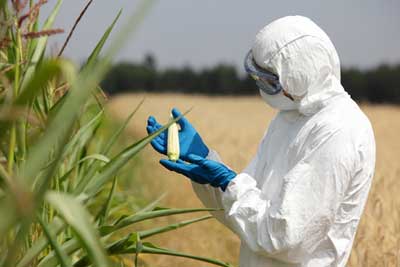
Corporate voices and their allies are calling for the promotion of genetically modified seeds – and changes to African laws to enable their spread – as a solution to low food production and hunger in Africa. In October, the World Food Prize was awarded to three scientists, including two from agribusiness giants Monsanto and Syngenta, for their breakthroughs in developing GMOs. The editors of The Washington Post recently appealed to “give genetically modified crops a chance” in Africa and called for an open debate. The Alliance for Food Sovereignty in Africa, a network of small holder farmers, pastoralists, hunter-gatherers, indigenous peoples, citizens and environmentalists from Africa, is pleased to include the voices of African farmers in that debate.
The promotion of GMOs as solution is too often disrespectful to African culture and intelligence and based on a shallow understanding of African agriculture. It is based on the image that is held by many Westerners who see Africa as poor, destitute, starving, disease-ridden, hopeless, helpless that needs to be saved by a white angel from the West. That image allowed colonialists to rationalize their scramble for Africa, and that image is being used by neo-colonialists to rationalize their scramble for African land and natural resources.
Those promoting the false solution of GMOs are recommending that African farmers develop a long-term, perhaps irreversible, cycle of dependence on the interests of a small handful of corporate decision-makers to determine what seeds, with what genetic characteristics, and requiring what chemical inputs, will be produced and made available to Africa’s people. This is a pathway toward profound vulnerability and centralized decision-making that flies in the face of the best agricultural evidence-based practices and sound policy making. The evidence and our experience with farmers clearly points to a more rational and appropriate path: investing in a transition toward more sustainable and agro-ecological farming systems that trust in the wisdom and capacity of tens of millions of African farmers to control, adapt and make decisions about their genetic resources, as the pathway toward greater well-being and resilience for Africa.
What is the story after 20 years of GMO cultivation in the United States? Farmers who took on herbicide-tolerant GMO crops are now struggling with the cost of combating herbicide-resistant super weeds. Some 49 percent of US farms suffer from Roundup-resistant super weeds, a 50 percent increase from the year before. As a result, since 1996 there has been a disproportionate increase in the use of weed killers – more than 225 million kilograms in the United States. Meanwhile, farmers who took on pest-resistant GMO crops are struggling with the cost of secondary pests unaffected by the built-in toxins. In China and India, initial savings from reduced insecticide use with Bt cotton have been eroded as secondary pests emerged.
According to the African Centre for Biosafety, in South Africa, single-trait Bt maize (meant to produce toxins to kill pests) has developed such complete insect resistance that it has been withdrawn from the market. In past seasons, extensive product failure meant that farmers were compensated for spraying insecticides on their crops to avoid economic loss. This failed technology will now be introduced to other African countries under the auspices of the Water Efficient Maize for Africa project being promoted by Monsanto and the Gates Foundation.
India has just placed a 10-year moratorium on planting its first genetically modified (GM) food crop. Mexico has banned the planting of GM maize, Peru has placed a 10-year moratorium on the import and cultivation of GM seeds, and Bolivia has committed to giving up growing all GM crops by 2015. Last year, China announced a move away from widespread adoption of GM crops for at least the next five years, in favor of developing more sustainable high-yield non-GM crops. Consumers more or less everywhere have been consistently hostile.
In the UN Conference on Trade and Development’s 2013 Trade and Environment Report, titled “Wake-up before it is too late: make agriculture truly sustainable now for food security in a changing climate,” the authors recommend that to meet future challenges, a “rapid and significant shift from conventional, monoculture-based and high-external-input-dependent industrial production towards mosaics of sustainable, regenerative production systems that also considerably improve[d] the productivity of small-scale farmers” is needed.
Genetically engineered crops have nothing to do with ending world hunger, no matter how much GMO spokespeople like to expound on this topic. African farmers should be supported in developing and spreading a proven, sustainable farming pathway to feed our people and achieve food sovereignty. Their voices should be given precedence in the debate above the propaganda of corporations, whose goal is to sell more GMOs and chemical inputs.
Join us in defending the truth before it’s too late
The future of independent journalism is uncertain, and the consequences of losing it are too grave to ignore. To ensure Truthout remains safe, strong, and free, we need to raise $44,000 in the next 6 days. Every dollar raised goes directly toward the costs of producing news you can trust.
Please give what you can — because by supporting us with a tax-deductible donation, you’re not just preserving a source of news, you’re helping to safeguard what’s left of our democracy.